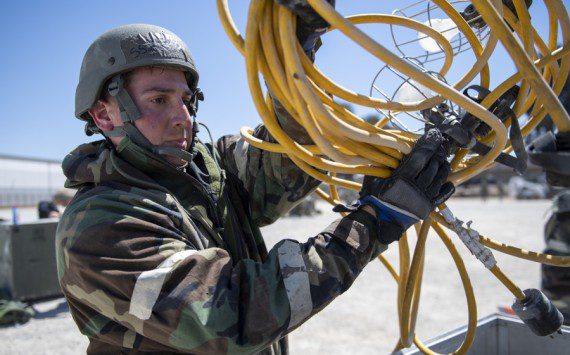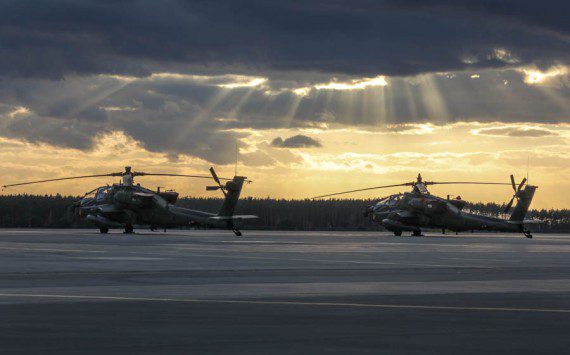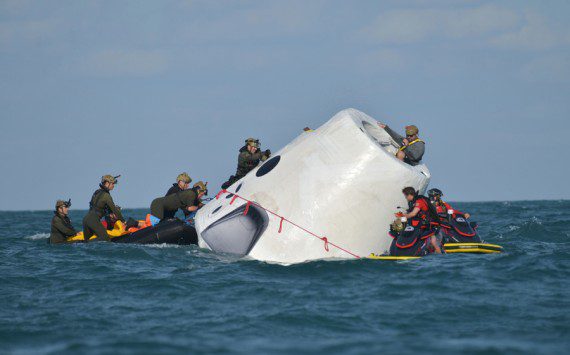Pentagon to probe legality of using troops on U.S. border
The Pentagon’s independent investigations office says it will evaluate the legality of the Trump administration’s use of the military at the U.S. southwestern border.
Glenn Fine, the acting inspector general, announced Dec. 10 that his probe will assess several aspects of the military’s border mission, which some in Congress call a misuse of the military. Fine said he will look at what the troops are doing at the border, what training they received for the mission, and whether their use at the border is legal.
For more than a year, the administration has placed several thousand active-duty troops along the border to perform various missions in connection with President Donald Trump’s campaign to clamp down on illegal entries. The troops have erected wire barriers, assisted with border surveillance and performed other functions in support of Department of Homeland Security.
In a letter to Fine in September, 33 House members urged an investigation of what they called the “misuse and politicization” of the military at the border. Under federal law, the military may not be used for domestic law enforcement purposes. The Trump administration’s view is that the troops are in a national security role at the border. AP
Navy: Flight training suspended for Saudi students
Flight training has been suspended for more than 300 Saudi Arabian students at three bases in Florida in the wake of the deadly shooting by a Saudi Air Force officer on Friday, the U.S. Navy said Dec. 10.
Navy Commander Clay Doss said classroom training is going to start again this week, and flight training for other students will resume. But the Navy on Monday evening ordered that Saudi students at three bases in northern Florida be restricted from flying for an undetermined period of time.
The flight restriction affects 140 students at Pensacola Naval Air Station, where the shooting occurred, and 35 at nearby Whiting Field. Another 128 students at Naval Air Station Mayport, on the Atlantic seaboard, are also restricted.
Doss said the stand-down is an effort to ensure the safety of the students, as they recover from the trauma of the shooting, which killed three U.S. military members and injured eight other people. Police shot and killed the Saudi shooter. AP
U.S. considers leaving smaller number of troops in Afghanistan
The Pentagon is considering several options to reduce the number of troops in Afghanistan, including one that would shift to a narrower counterterrorism mission, the top U.S. military officer told Congress on Dec. 11.
Gen. Mark Milley, chairman of the Joint Chiefs of Staff, did not disclose any potential troop totals, but he agreed that leaving a minimal U.S. footprint in Afghanistan to battle terrorists is a potential move.
“`We have multiple options, that’s one of them,” he said. The U.S. currently has about 13,000 troops in Afghanistan. About 5,000 of them are doing counterterrorism missions. The remainder are part of a broader NATO mission to train, advise and assist the Afghan security forces.
Members of the House Armed Services Committee pressed Milley and Defense Secretary Mark Esper on a number of issues during the hearing, including lawmakers’ demands for a hearing on whether the Pentagon deceived the American people about military progress during the 18-year war.
Esper, who testified alongside Milley, told the committee that the U.S. military must remain focused on the counterterrorism mission even as efforts are made to negotiate a peace deal with the Taliban.
“We have an important counterterrorism mission in Afghanistan,” he said. “That means we’ve got to make sure Afghanistan never becomes again a safe haven for terrorists that can strike the United States.”
He said commanders have told him and Milley that the U.S. can reduce its presence in Afghanistan and still perform the counterterrorism mission. AP
Turkey hints it could bar U.S. from using key air bases
Turkey’s foreign minister suggested Dec. 11 that the United States could be barred from using two strategic air bases in retaliation to possible U.S. sanctions against his country, the state-run Anadolu Agency reported.
Mevlut Cavusoglu comments came amid reports that U.S. lawmakers had agreed on a defense bill that also includes calls to sanction Turkey over its decision to proceed with the purchase and deployment of Russian-made S-400 missile defense systems.
“In the event of a decision to sanction Turkey, the Incirlik and Kurecik airbases can be brought to the agenda,” Anadolu quoted Cavusoglu as saying.
He said, “Congress members must understand that it is not possible to get anywhere with sanctions.”
Incirlik airbase in southern Turkey has been a main base for U.S. operations in the Middle East and more recently in the fight against the Islamic State group in Syria and Iraq, while Kurecik, in eastern Turkey, is a key NATO base.
Turkey’s decision to proceed with the purchase of the Russian system has added to growing tensions between the two NATO allies. Washington says the Russian system poses a threat to NATO and has removed Turkey from the U.S.-led F-35 stealth fighter jet program.
Tensions were raised further after Turkey launched an incursion into northeastern Syria to drive away Syrian Kurdish forces that had partnered with the U.S. in the fight against the Islamic State group. Turkey considers the Kurdish fighters as terrorists because of their links to outlawed Kurdish rebels fighting inside Turkey. AP
Airbus beats Boeing again in aircraft orders, deliveries
Boeing’s grounded 737 Max got a boost from two orders in November, but the American aircraft company continues to trail Europe’s Airbus in both orders and deliveries of airline planes.
Boeing disclosed Dec. 10 that it received 11 net orders in November — 63 new orders but 52 cancellations.
Turkey’s SunExpress ordered 10 Max jets, and an unidentified buyer took 20. However, 10 other Max orders were canceled or switched to other Boeing planes, the company said.
Orders for the Max vanished for several months after the plane was grounded in March following two crashes that killed 346 people. Boeing is behind schedule in completing changes to software and computers that it hopes will convince regulators to let the plane fly again.
The Chicago-based company delivered 24 planes in November, down from 79 a year earlier, when half the planes it shipped were Max jets. Boeing halted Max deliveries after the grounding, cutting off a vital source of cash flow.
By contrast, Airbus reported last week that it took 222 new orders — 120 in one deal with Air Arabia — and delivered 77 commercial planes in November.
Boeing could deliver fewer than half the planes it shipped in 2018. Through November, it recorded 345 deliveries this year, far behind the pace of last year, when it finished with 806 deliveries.
Chicago-based Boeing has said the company hasn’t lost a major order because of the Max crashes. But some customers have shifted orders to other Boeing planes, a Saudi discount carrier backed out of a tentative deal for Max jets, and Boeing lost other orders because of the financial collapse of India’s Jet Airways.
Analysts for financial services firm Cowen said Tuesday that Boeing’s November deliveries were better than expected, and even the 11 net orders were “decent.” The analysts said, however, investors are likely to keep focusing on delays in the Max’s return to service and on growth in global air travel. AP












